Writes a Deceitful Article in The Atlantic Magazine That Distorts History to Defend His Fateful Presidential Blunder.
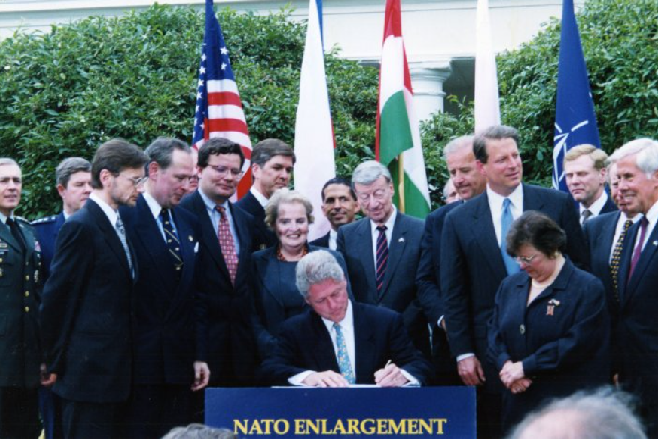
With the Ukraine war expanding and the threat of nuclear catastrophe rising, Bill Clinton has written an article in The Atlantic magazine trying to defend what many see as indefensible: his administration’s support for the expansion of the North Atlantic Treaty Organization (NATO) in March 1999 into Poland, Hungary and the Czech Republic against a pledge by the Bush administration to Mikhail Gorbachev that NATO would not expand “one inch eastward.”
Clinton had been warned at the time by Russian President Boris Yeltsin (1991-1999) that NATO expansion would result in “nothing but humiliation for Russia” and could provoke a new Cold War.
Yeltsin told Clinton:
“How do you think it looks to us if one bloc [from the Cold War] continued to exist when the Warsaw Pact has been abolished? It’s a new form of encirclement if the one surviving Cold War bloc expands right up to the borders of Russia.”[1]
A similar warning was issued by George F. Kennan, the father of the Cold War containment doctrine.
He wrote in an op-ed in February 1997 that NATO expansion would amount to a “strategic blunder of epic proportions” and the “most fateful error of American policy in the entire post-Cold War era,” as it would “inflame the nationalistic, anti-Western and militaristic tendencies in Russian opinion,” and “restore the atmosphere of the cold war to East-West relations,”[2] which is exactly what happened.
Nearly 20 years after Kennan’s op-ed was published, Clinton’s former Defense Secretary, William J. Perry, gave an interview to the London Guardian in which he acknowledged that the U.S. bore a large degree of blame for the proxy war that had broken out between the U.S. and Russia in eastern Ukraine.
Perry stated:
“Our first action that really set us off in a bad direction was when NATO [North Atlantic Treaty Organization] started to expand, bringing in Eastern European nations, some of them bordering Russia. At that time, we were working closely with Russia and they were beginning to get used to the idea that NATO could be a friend rather than an enemy … but they were very uncomfortable about having NATO right up on their border and they made a strong appeal for us not to go ahead with that.”[3]
Invoking the Trope of Russian Expansion to Justify U.S. Imperialism
In his Atlantic essay, Clinton claimed that his administration had first worked to foster cooperative relations with Boris Yeltsin and democratize Russia, and supported NATO expansion as a fallback to protect European security in case Russia returned to “ultranationalism” and its “aspirations to empire like [in the era of] Peter the Great and Catherine the Great.”[4]
Guy Mettan, in his book Creating Russophobia: From the Great Religious Schism to Anti-Putin Hysteria(Atlanta: Clarity Press, 2017), points out that the threat of Russian expansion has been invoked by Western leaders since the era of Charlemagne to justify their own expansionist policies.
The United States during Clinton’s presidency wanted to capitalize on the collapse of the Soviet Union to expand its power and influence in the Eurasian heartland, which geopolitical strategists like Zbigniew Brzezinski viewed as key to global domination.[5]
NATO expansion under Clinton coincided with support for “color revolutions” targeting pro-Russian and socialist leaders such as Alexander Lukashenko of Belarus,[6] and aggressive penetration of Central Asia in an attempt to pry its oil wealth away from Russia.
In 1997, the U.S. Department of State told Congress that the Caspian Basin held as much as 200 billion barrels of oil—about ten times the amount found in the North Sea, and one-third of the Persian Gulf’s total reserves.[7]
In the next three years, the Clinton administration provided $175 million in arms and military training and more than $1 billion in aid to countries in the region. Strategic planners sought to incorporate it into a “vast U.S. dependency,” which NATO would help secure.[8]
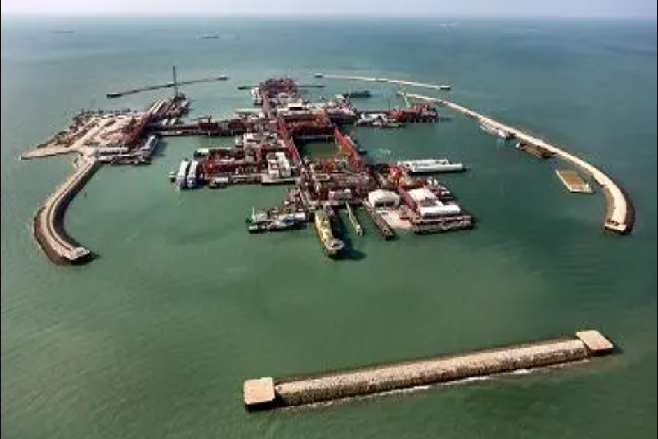
Some $302 million was provided to the Georgian government of Eduard Shevardnadze, who had come to power in a coup d’état backed by the Western powers which toppled nationalist Zviad Gamsakhurdia, who died under suspicious circumstances a year later.[9]
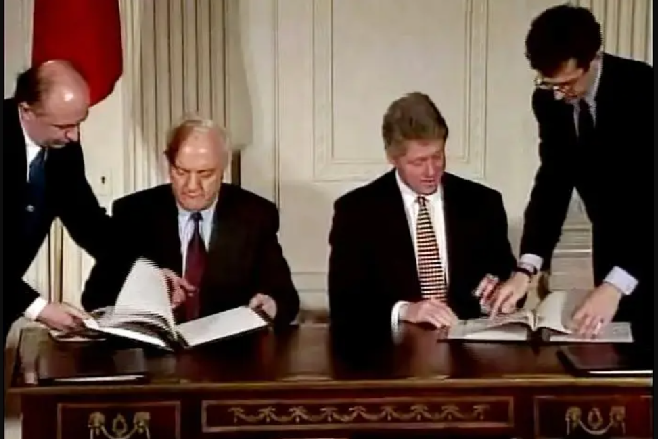
Shevardnadze’s main value to the West was his commitment to protecting the primary oil export pipeline that crossed Georgia from Azerbaijan on the way to Turkey in an attempt to bypass Russia.
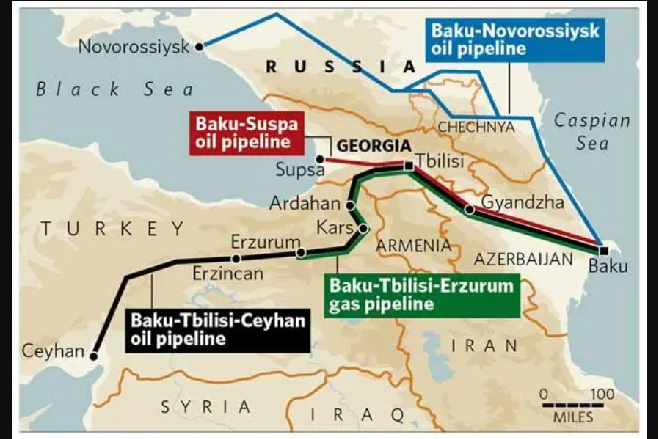
The Clinton administration forged another defense alliance with Kazakh dictator Nursultan Nazarbayev (1990-2019), who had sold a 20% stake in the Tengiz offshore oil fields to Chevron after being bribed by an oil industry consultant, and carried out military training exercises in Uzbekistan under the auspices of the NATO Partnership for Peace (PFP) Program, in which the U.S. military nurtured “the embryo of a NATO-led military force in Central Asia.”[10]
Clinton’s essay erroneously makes it seem that NATO expansion was purely defensive and in reaction to potential future Russian aggression—rather than rooted in any U.S. imperial designs. Clinton also omits the role of military lobbies: According to an analysis prepared for The New York Times by a research company in Springfield, Virginia, America’s six largest military contractors spent $51 million on lobbying for NATO expansion between 1996 and 1998.[11]
Democracy Promotion American-Style
Clinton’s claims about trying to democratize Russia under Yeltsin’s rule are absurd, considering that Clinton expressed full support for Yeltsin after he ordered a siege of the Russian parliament in September 1993.
This was after the parliament repudiated the rapid privatization or “shock therapy” policies supported by the Clinton administration that resulted in the selling off of Russian state assets for a fraction of their worth to Yeltsin’s cronies and a new class of oligarchs.[12]
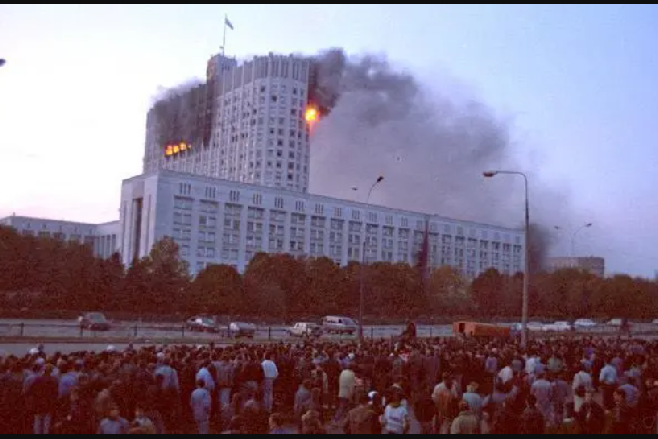
The Clinton administration went on to sabotage Russian democracy further when it intervened to rig the 1996 Russian election on Yeltsin’s behalf.
The National Endowment for Democracy (NED)—which gave nearly $1 million between 1990 and 1992 to the anti-communist Democratic Russia Movement that provided Yeltsin his political base[13]—received USAID grants for conferences, message development, focus groups, polling methods and television ads that were provided to members of Yeltsin’s political machine.
Three American political consultants also went to work on Yeltsin’s re-election bid promoting dirty tricks urging Yeltsin to “go negative” by rallying the oligarch-controlled Russian media to whip up “a wild anti-Communist psychosis among the people,” as one sympathetic news editor put it.[14]
Some great democracy promotion.
Madeleine’s Ghost
At the end of his Atlantic essay, Clinton provided a tribute to his former Secretary of State Madeleine Albright, a Czech émigré who had exclaimed “hallelujah” after Clinton had signed off on NATO expansion in March 1999.
According to Clinton, “few diplomats have ever been so perfectly suited for the times they served as Madeleine….she understood that the end of the Cold War provided the chance to build a Europe free, united, prosperous, and secure for the first time since nation-states arose on the continent.”
Unfortunately, we see today that the policy of NATO expansion has not secured a prosperous, united, and free Europe as Albright envisioned.
Rather it has resulted in a divided and unequal one embroiled in a devastating war that threatens to extend further.
*
Note to readers: Please click the share buttons above or below. Follow us on Instagram, Twitter and Facebook. Feel free to repost and share widely Global Research articles.
Jeremy Kuzmarov is Managing Editor of CovertAction Magazine. He is the author of four books on U.S. foreign policy, including Obama’s Unending Wars (Clarity Press, 2019) and The Russians Are Coming, Again, with John Marciano (Monthly Review Press, 2018). He can be reached at: jkuzmarov2@gmail.com.
Notes
- “Summary Report on One-on-One Meeting Between Presidents Clinton and Yeltsin, May 10, 1995, 10:10 a.m. – 1:19 p.m., St. Catherine’s Hall, The Kremlin,” National Security Archive, https://nsarchive2.gwu.edu//dc.html?doc=4950563-Document-04-Summary-report-on-the-one-on-one
- George F. Kennan, “A Fateful Error,” The New York Times, February 5, 1997.
- Quoted in Thomas L. Friedman, “This Is Putin’s War. But America and NATO Aren’t Innocent Bystanders,” The New York Times, February 21, 2022, https://www.nytimes.com/2022/02/21/opinion/putin-ukraine-nato.html
- Bill Clinton, “I Tried to Put Russia on Another Path,” The Atlantic, April 7, 2022, https://www.theatlantic.com/ideas/archive/2022/04/bill-clinton-nato-expansion-ukraine/629499/
- See Zbigniew Brzezinski, The Grand Chessboard: American Primacy and its Geostrategic Imperative (New York: Basic Books, 1998). Zbig’s son Mark, who served on Clinton’s National Security Council from 1999-2001 and is now U.S. ambassador to Poland, was a key figure carrying out Clinton’s policy of NATO enlargement.
- See Stewart Parker, The Last Soviet Republic: Alexander Lukashenko’s Belarus (London: Trafford, 2007), 136, 137.
- Michael T. Klare, Resource Wars: The New Landscape of Global Conflict (New York: Holt, 2002), 84, 85.
- Klare, Resource Wars, 85.
- Lutz Kleveman, The New Great Game: Blood and Oil in Central Asia (New York: Atlantic Monthly Press, 2003), 44; Michael Pullara, The Spy Who Was Left Behind: Russia, the United States, and the True Story of the Betrayal and Assassination of a CIA Agent (New York: Scribner, 2018), 17, 18, 19.
- Nasser Saghafi Ameri, “The Emerging NATO: Impact on Europe and Asia,” in Europe and Asia: Perspectives on the Emerging International Order, V.P. Malik and Erhard Crome, eds. (New Delhi: Lancer Publishers & Distributors, 2006), 153; Ken Silverstein, The Secret World of Oil (London: Verso, 2014), 21, 22. Uzbekistan at the time was ruled by Islam Karimov, who was accused of boiling political opponents alive.
- Katharine Q. Seelye, “Arms Contractors Spend to Promote an Expanded NATO,” The New York Times, March 30, 1998.
- Sean Guillory, “Dermokratiya, USA,” Jacobin, March 13, 2017; David Foglesong, The American Mission and the “Evil Empire”: The Crusade For a “Free Russia” since 1881 (New York: Cambridge University Press, 2007),208; Helen Thomas, “Clinton Supports Yeltsin in Crisis,” UPI Archives, September 21, 1993, https://www.upi.com/Archives/1993/09/21/Clinton-supports-Yeltsin-in-crisis/7235748584000/
- Colin Cavell, Exporting ‘Made in America’ Democracy: The National Endowment for Democracy & U.S. Foreign Policy (Lanham, MD: University Press of America, 2002), 110.
-
Peter Beinart, “The U.S. Needs to Face Up to Its Long History of Election Meddling,” The Atlantic, July 22, 2018; Eleanor Randolph, “Americans Claim Role in Yeltsin Win,” Los Angeles Times, July 9, 1996; Fred Weir, “Betting on Boris,” CovertAction Quarterly(Summer 1996), 38, 41; Holly Sklar and Chip Berlet, “NED, CIA and the Orwellian Democracy Project,” CovertAction Quarterly 39 (Winter 1991-1992); Dick Morris and Eileen McGann, Because He Could (New York: Regan Books, 2004), 171.